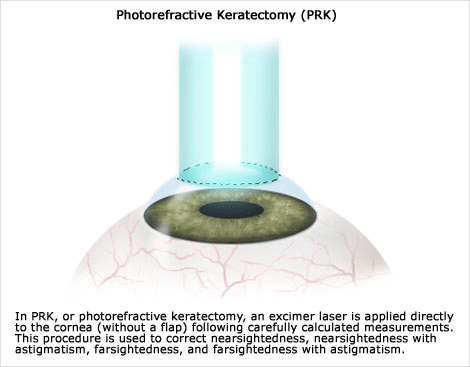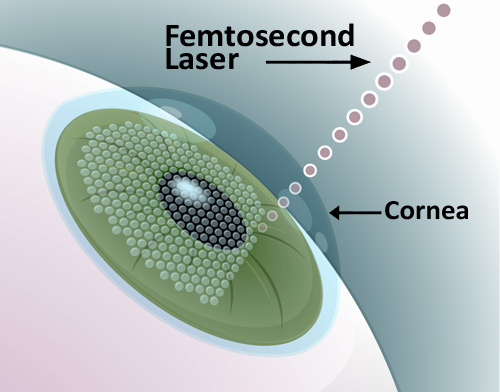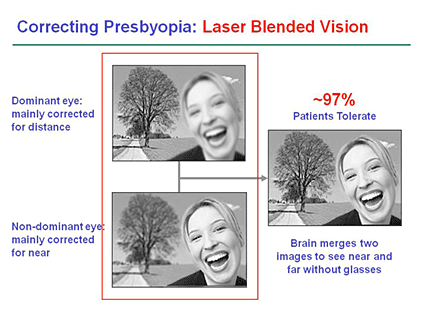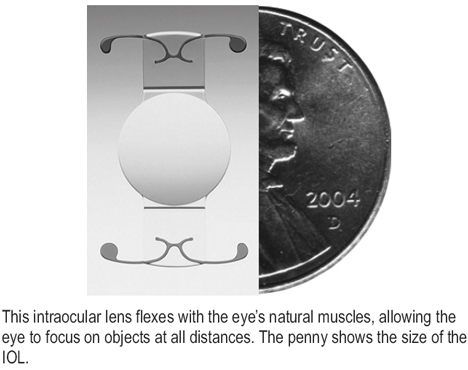Hundreds of thousands of people around the world are enjoying more freedom in recreational activities, performing more comfortably at their jobs, and experiencing a higher quality of life as a result of vision correction surgery.

Is it important for you to see better on your job without the aid of corrective eyewear? Do you long to be able to read the clock when you wake up without fumbling for your glasses? Do you want to see well enough to take care of yourself in an emergency? The goal of vision correction surgery is to reduce or eliminate your need for corrective eyewear.
At Stokes Vision Correction Center, we employ the latest technology, including advanced laser surgery, backed by years of experience, to help you achieve improved vision for your lifestyle.
LASIK is the most common laser vision correction procedure performed today. This procedure is performed by creating a thin flap and then utilizing an excimer, or computer controlled ultraviolet (cold) laser, to sculpt the underlying cornea into a new shape. This corrects nearsightedness, farsightedness, and astigmatism, thus eliminating or reducing the need for glasses or contact lenses.
We offer standard treatment options as well as the most advanced, customizable, options available. You and your physician can decide which option is best for your individual needs.
To be a candidate for refractive surgery you must meet the following requirements:
Certain medications and other factors may exclude you from surgery. If you would like to find out if any of these or other factors affect you specifically, please schedule a free screening with one of our patient counselors.
Contact us (843)664-2127
Download LASIK Registration form.

CustomVue is the latest in LASIK technology. This technology upgrade utilizes the measurements taken from the WaveScan device to provide a customized LASIK treatment that is tailored for each individual patient.
Your vision is as unique as your fingerprint. Previous methods of measuring vision only provided a certain level of correction regardless of individual needs. As a result, many people were not able to achieve their full visual potential due to the fact that it was impossible to measure the subtle imperfections of the eye. WaveScan technology is a way for doctors to identify and measure individual imperfections in an eye 25 times more precisely than with standard methods. These measurements can then be input into the laser, providing a new level of precision and accuracy. The result is CustomVue™ individualized laser vision correction.
WaveScan Technology, simply put, is a much more accurate way to measure vision. The resulting correction performed with the Visx Star S4 laser greatly reduces the potential for visual imperfections that are sometimes noticed with standard treatments. Some patients report that they have excellent vision (in some cases 20/20 or better), but notice that it is not as sharp in low light situations such as driving at night. These visual aberrations have names like "glare" and "halo".
As with all surgical procedures, not everyone is a candidate for CustomVue™ LASIK. CustomVue™ LASIK was approved in May 2003 for the treatment of moderate nearsightedness with or without astigmatism. Although the laser beam is delivered in a different manner, the surgery itself is identical to standard LASIK. Patients who are not candidates for standard LASIK are not candidates for CustomVue™ treatment. For more information please contact our office to see if you might be a candidate.

PRK or Advanced Surface Ablation is actually the forerunner of LASIK and certain circumstances may present the need for an alternative to LASIK.
This procedure is as effective as LASIK but may be a safer procedure for patients that have thin corneas, dry eyes, or other corneal issues. Even having certain vocations may play a factor in the most suitable procedure for a patient.
The surgeon does not have to create a corneal flap during PRK. Therefore, PRK offers less uncertainty and there is no risk of flap complication. The visual recovery is slower but the final outcome should be the same for patients that have PRK compared to LASIK. The CustomVue treatment can be used with PRK as it is with LASIK to give patients the most customized treatment for their individual eyes.
The CustomVue treatment can be used with PRK to give patients the most advanced correction for their individual eyes. PRK and LASIK are popular because both surgical procedures have proven to be safe and effective.

Bladeless eye surgery is the same as Lasik eye surgery however with Bladeless LASIK, a femtosecond laser uses short pulses of invisible light energy to separate the layers of tissue creating a custom corneal flap.
Traditional Lasik eye surgery uses a microkeratome to make the flap in the eye so the laser can be applied to the base of the eye to reshape the eye. However with Bladeless LASIK, a femtosecond laser uses short pulses of invisible light energy to separate the layers of tissue creating a custom corneal flap.
There are many advantages to using Bladeless eye surgery over the traditional Lasik eye surgery. These advantages include the fact that the majority of patients recover faster from the surgery. This is a result of the precision used by the laser when making the flap rather than using a manual instrument. Bladeless surgery is more accurate than Lasik eye surgery it usually produces better results and more patients go onto achieve 20/20 vision. Another point to consider is that Bladeless is usually safer than Lasik because no blade is used. The flap is cleaner due to a better cut which make it less prone to infections and inflammations.
The usual side effects associated with laser eye surgery are experienced up to 48 hours after treatment including dry eyes, sensitivity to light, and blurred night vision. Regular aftercare appointments will ensure the healing process is going as planned and that the Bladeless eye treatment has been successful.

Monovision eye surgery is an effective way to treat presbyopia, the age-related farsightedness that requires most people over the age of 40 to use reading glasses from time to time.
Most people choose to correct their vision with bifocal glasses or bifocal contact lenses. However, monovision eye surgery is growing in popularity as a way to combat presbyopia without the need for contacts or glasses.
Many people with presbyopia are unsure what monovision is. Monovision is a procedure that corrects one eye for distance vision, while correcting the other eye for near vision. Because the dominant eye is treated for distance vision, the brain is easily able to compensate for the two different levels of correction.
There are several different methods of attaining monovision, including contact lenses, intraocular lenses, and LASIK monovision eye surgery. Your ophthalmologist can help you decide what the best choice is for your monovision procedure.
Monovision LASIK surgery is the most recent development in presbyopia treatment. Rather than using glasses or contacts to achieve monovision, Lasik surgery can permanently correct one eye for distance vision and the other for near vision, allowing patients to reduce or eliminate their dependence on glasses and contacts.
As with any type of surgery, LASIK monovision surgery has some potential problems associated with it. Because the eyes are designed to work together to focus on objects, monovision may interfere somewhat with depth perception. Also, monovision eye surgery can cause reduced peripheral focus in certain circumstances, for instance when patients glance quickly at rear-view mirrors in the car.
Because monovision surgery is permanent, it is recommended that patients first try monovision with contact lenses to determine whether problems might occur. Though it takes a while to adjust to monovision after surgery, most people are pleased that they no longer have to rely on reading glasses or bifocals.

Refractive lens exchange (RLE) is a type of vision correction surgery in which the eye's natural lens is removed and replaced with a man-made intraocular lens (IOL). Alternative names occasionally used for RLE are clear lens exchange, clear lens extraction or CLE.
Refractive lens exchange is essentially the same surgical procedure as cataract surgery, which is performed on approximately three million Americans each year. But in RLE, the eye's natural lens is not clouded-the clear lens is removed and replaced with an IOL simply to change the focusing power of the eye. Refractive lens exchange can reduce or eliminate large amounts of nearsightedness and farsightedness and therefore may be a better surgical solution than LASIK for high prescriptions.
Because refractive lens exchange is an internal eye procedure with the potential for more risks and complications than laser vision correction surgery, RLE is generally reserved for people who are not good candidates for LASIK, PRK or other laser procedures or who have high amounts of nearsightedness or farsightedness that are beyond the accepted treatment range for laser surgery.
The same refractive intraocular lenses used for cataract surgery can be used for RLE, including accommodating IOLs and multifocal IOLs to correct presbyopia as well as refractive errors.
RLE can effectively correct high amounts of nearsightedness and farsightedness that may not be adequately corrected by LASIK. It also is a viable alternative to LASIK for eyes with corneas that may be too thin for laser vision correction.
Other advantages of RLE include:

LASIK combines conventional surgery with laser surgery. The procedure has its origins in the early 1990's and has evolved over the years into an effective method to correct more refractive errors.
The first step in the procedure involves the creation of a thin flap of corneal tissue using a specialized device. This flap is then lifted to expose the corneal bed. The excimer laser reshapes the curvature of the exposed corneal tissue, and then the flap is repositioned to cover the newly curved corneal tissue. This flap adheres without stitches and minimizes discomfort by covering any exposed area.
Yes. Stokes Vision Correction Center (SVCC) utilizes the latest in variable spot scanning laser technology with Iris registration. The Visx laser system utilized at SVCC also incorporates an advanced tracking system to monitor eye movement and provide precisely centered treatments.
A free screening will help determine if you are indeed a candidate for LASIK. Eye diseases such as herpes simplex or on-going systemic auto-immune diseases may disqualify you from surgery. Women who are pregnant must wait until after they have delivered and stopped nursing before having the procedure. While LASIK is very effective, it is not the automatic answer for everyone. In some cases advanced surface ablation may be a preferred procedure. Once an evaluation is performed, your ophthalmologist will discuss which procedure might be more appropriate for you.
Yes. In addition to nearsightedness and farsightedness, LASIK can be used to correct astigmatism.
We recommend that you take at least one full day for the procedure. On the day of your procedure, plan on being at Stokes Vision Correction Center for approximately 2 hours. This allows time for you to review and complete all necessary paperwork. The initial cleaning and anesthetizing of your eye(s) will be done when you enter the laser suite. You will be in the laser room for about 15-20 minutes. After the procedure, your surgeon will see you once again to examine your eyes, then you will be allowed to leave.

You will need to see your surgeon the day after your procedure. Additional follow-up exams are typically performed at 2 weeks, 3 months, 6 months, and 12 months. These exam schedules may vary depending on individual recovery and specific procedure. Patients are advised to rest for about 2/3 hours following surgery to aid in the recovery process. Your eyes may be itchy and/or watery. Sleep will help calm this feeling and speed up healing. Most patients are able to return to work within 24 hours. There is a two week period in which you should avoid rubbing your eyes and avoid very dusty or dirty environments. You should avoid contaminated water, swimming, and hot tubs for 2 weeks. Eye make-up should not be worn 3 days prior to surgery and 5 days after surgery. Of course, you may always contact us at any time if there are problems or concerns.
While there is not surgical procedure that can guarantee that glasses will not be necessary afterward, most patients do not require glasses following surgery. Those who do generally use them only in certain circumstances such as driving at night or in the rain. WaveScan® Technology can greatly reduce this possibility for those who are candidates. Reading glasses may be necessary with patients in their early 40's and older if both eyes are corrected for distance vision.
Patients experience virtually no discomfort during the LASIK procedure. The procedure is performed using only topical anesthesia (eye drops).
In the initial weeks following your procedure, it is possible to have some night glare due to the healing process. This is usually temporary. Your ophthalmologist will discuss any factors that could affect your night vision when you are evaluated. You may even be a candidate for WaveScan® Technology which can greatly reduce the possibility of nighttime visual disturbances.
A small retaining device is used to prevent this from happening. You will not be able to blink.
Yes. Most patients choose to have both eyes treated at the same time; however, the decision will be left up to you unless your surgeon feels there is a need to treat only one eye at the time. If that is the case, he will fully discuss it with you prior to your surgery.
An antibiotic and a steroid drop will be prescribed after your surgery that you will use 4 times a day for seven days. Artificial tears will be needed for the first few months after surgery.
Some patients may experience one or more of the following side effects of the procedure.
NOTE: A more complete list of potential complications is available for your review. Please ask your doctor for a copy.
Call now to schedule an appointment for a free screening or an evaluation if you are ready to enjoy a new found freedom. The counselors at Stokes Vision Correction Center can explain all of the refractive procedures available today to determine if you are a candidate as well as discuss an affordable payment plan. Ask for a LASIK counselor at (843)664-2127.
At Stokes Regional Eye Centers, we consider patient satisfaction our main focus. Our dedication to quality treatment ensures a superior result that shows in the smiles of our patients. Nothing gives us more satisfaction than providing quality service that can literally change a patient's life. The following article was written by one of our patients and appeared in our local newspaper.
This is concerning the article in the Morning News a few weeks ago on LASIK eye surgery. I got glasses when I was in the first grade and then contact lens in the seventh grade. Every time I went to get my eyes examined I would need stronger contacts. I wore them all the time, of course, but when I had to read I also had to wear a pair of glasses. After I had been going to Stokes Eye Clinic for a few years, and had asked about this surgery, Dr. Isam Zakhour told me they were going to start doing it there.
This was in January 2000. I had my surgery on Feb. 3, 2000. I was so excited, because then I was legally blind without my contacts. Dr. Mark Ross did my surgery and I have been completely satisfied.
The surgery didn't take long and there was no pain. When I sat up afterward, I could already see shapes better than I had seen them in years, they were a little blurry, but I could see. I am
not ashamed to say that I cried. I can't tell you the feeling I had to get my sight back. As my daughter took me home, I was reading all the signs along the road like I had never seen them
before, and I had been going along that road for 48 years, but somehow that day was different. I can even thread a needle without glasses or contacts and that is an accomplishment. I thank
God every day for giving these doctors the knowledge of this surgery and their dedication to their patients. Thank you Dr. Zakhour and Dr. Ross from a very satisfied and grateful patient.
- Alice Gaynelle Fleener
These are a few patients who have had LASIK performed at Stokes Regional Eye Centers and their comments.

Refractive surgery for me was a good decision. It improved my vision and allowed me to get rid of my glasses. It was a challenging decision to make after reviewing the pros and cons, but I made
the decision and I'm pleased with the results.
- Travis Brunson
Very positive experience. Results far exceeded my expectations. I would definitely recommend LASIK surgery. Upon my recommendation, several friends have already had the surgery.
- Kim Coxe
I was honestly very nervous. On the other hand, to be able to see the procedure being done and for me to be able to see when I sat up was 'AMAZING' I'm loving it, it feels so great, especially
to wake up in the middle of the night and read the clock. Previously I had a prescription of - 8.50 and could not see anything without correction. I am very pleased.
- Tracy Brooks
I was a little nervous about the procedure, but everyone at Stokes was very patient with my questions. Dr. Ross and everyone did an excellent job and my vision is as good if not better than with
contacts. Best of all, I don't have to have glasses or contacts anymore. The results have been wonderful.
- Rodney Gibbs

I was apprehensive at first, but Dr. Ross and staff have been very helpful and comforting throughout the process. Very fast and painless operation. Only took 15 minutes. I experienced no pain
and had no side effects. It is great not to have to wear glasses anymore.
- Joe Firimonte
It was wonderful to sit up from the surgery and be able to see. I could read the newspaper the afternoon of the surgery. After wearing contacts for 35 years it's nice not to feel something in
your eyes.
- Denise Caulder
I was impressed by the professionalism by everyone at Stokes. Because of that I had complete confidence in them. The results of the surgery were so much more than I could have imagined. Everyone
was very nice and professional. I had complete confidence in Dr. Ross and the results of the surgery have been wonderful!
- Mandy Bateman